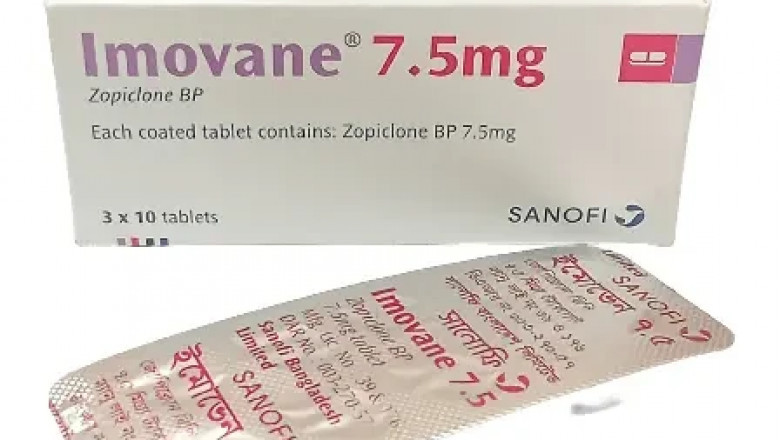views
Imovane 7.5 mg, containing the active ingredient zopiclone, is a prescription medication commonly used for the short-term treatment of insomnia. As a non-benzodiazepine hypnotic agent, Imovane helps individuals fall asleep faster, reduce nighttime awakenings, and improve overall sleep quality. This article provides an in-depth overview of Imovane 7.5 mg, including its uses, dosage guidelines, potential side effects, precautions, and more.
What Is Imovane 7.5 mg?
Imovane 7.5 mg is a brand name for zopiclone, a sedative-hypnotic medication classified as a cyclopyrrolone. It works by modulating the gamma-aminobutyric acid (GABA) neurotransmitter system in the brain, promoting relaxation and inducing sleep. Unlike benzodiazepines, zopiclone has a different chemical structure but produces similar hypnotic effects.
The 7.5 mg dosage is typically prescribed for adults experiencing difficulty falling asleep or maintaining sleep throughout the night. It is important to note that Imovane is intended for short-term use, generally not exceeding 7 to 14 consecutive days, to minimize the risk of dependence and tolerance.
How Does Imovane Work?
By binding to specific GABA receptors, zopiclone increases GABA's calming effects, leading to sedation, reduced anxiety, and muscle relaxation. This mechanism helps individuals with insomnia initiate and maintain sleep more effectively.
The onset of action for Imovane is relatively quick, with peak plasma concentrations reached within 1 to 2 hours after oral administration. Its elimination half-life ranges from 3.5 to 6.5 hours, allowing for a full night's sleep without significant next-day residual effects when used appropriately.
Recommended Dosage and Administration
The standard adult dose of Imovane for treating insomnia is 7.5 mg taken orally just before bedtime. For elderly patients or those with liver or kidney impairment, a lower starting dose of 3.75 mg may be recommended to reduce the risk of excessive sedation and other adverse effects.
Key Administration Guidelines:
Take Imovane immediately before going to bed.
Ensure that you can have a full night's sleep (7 to 8 hours) before taking the medication.
Avoid consuming alcohol or other central nervous system depressants while taking Imovane.
Do not exceed the prescribed dose or duration of treatment.
It's crucial to follow your healthcare provider's instructions regarding dosage and duration to minimize the risk of dependence and withdrawal symptoms.
Potential Side Effects
Like all medications, Imovane may cause side effects.
Common Side Effects:
Bitter or metallic taste in the mouth
Dry mouth
Drowsiness or fatigue
Dizziness
Less Common Side Effects:
Nausea or vomiting
Abdominal discomfort
Mood changes, such as irritability or agitation
Confusion or memory disturbances
Blurred vision
Serious Side Effects (Seek Immediate Medical Attention):
Allergic reactions (e.g., rash, itching, swelling, difficulty breathing)
Hallucinations or delusions
Depression or suicidal thoughts
Complex sleep-related behaviors (e.g., sleepwalking, sleep-driving)
If you experience any severe or concerning side effects, contact your healthcare provider promptly.
Precautions and Warnings
Before starting Imovane, inform your doctor about any medical conditions, allergies, or medications you are currently taking. Specific precautions include:
Liver or Kidney Impairment: Dosage adjustments may be necessary for individuals with liver or kidney dysfunction.
Mental Health Conditions: Use caution if you have a history of depression, anxiety, or other psychiatric disorders, as Imovane may exacerbate symptoms.
Substance Abuse History: Individuals with a history of substance abuse should use Imovane cautiously due to the risk of dependence.
Elderly Patients: Older adults may be more sensitive to the effects of Imovane, increasing the risk of falls and cognitive impairment.
Interactions with Other Substances
Imovane can interact with various medications and substances, potentially altering its effectiveness or increasing the risk of adverse effects.
Notable Interactions:
Alcohol: Combining Imovane with alcohol can enhance sedative effects, leading to increased drowsiness, respiratory depression, and risk of overdose.
Central Nervous System Depressants: Concurrent use with other sedatives, hypnotics, or tranquilizers can amplify CNS depression.
CYP3A4 Inhibitors: Drugs like erythromycin, ketoconazole, and ritonavir can increase zopiclone levels, enhancing its effects and side effects.
CYP3A4 Inducers: Medications such as rifampicin and carbamazepine may decrease zopiclone levels, reducing its efficacy.
Dependence, Tolerance, and Withdrawal
Prolonged use of Imovane can lead to physical and psychological dependence. Tolerance may develop, requiring higher doses to achieve the same effect, which increases the risk of adverse outcomes.
Withdrawal Symptoms May Include:
Anxiety
Insomnia
Irritability
Tremors
Sweating
Palpitations
To minimize withdrawal risks, do not abruptly stop taking Imovane. Consult your healthcare provider for a gradual tapering plan if discontinuation is necessary.
Special Considerations
Elderly Population:
Older adults are more susceptible to the sedative effects of Imovane, increasing the risk of falls, confusion, and cognitive impairment. Lower starting doses and close monitoring are recommended for this population.
Driving and Operating Machinery:
Avoid driving, operating heavy machinery, or engaging in activities requiring alertness until you know how the medication affects you.
Children and Adolescents:
Imovane is not approved for use in individuals under 18 years of age due to insufficient safety and efficacy data.
Storage and Disposal
Store Imovane tablets at room temperature, away from moisture and heat.
Keep the medication out of reach of children and pets.
Do not use Imovane past its expiration date.
Dispose of unused or expired medication properly, following local guidelines or returning it to a pharmacy.
Conclusion
Imovane 7.5 mg is an effective short-term treatment option for individuals struggling with insomnia. However, due to the potential risks of dependence, tolerance, and side effects, it's essential to use Imovane under the guidance of a healthcare professional.
Always adhere to prescribed dosages, avoid combining with alcohol or other CNS depressants, and consult your doctor before making any changes to your medication regimen. With responsible use, Imovane can be a valuable tool in managing short-term sleep disturbances.














Comments
0 comment